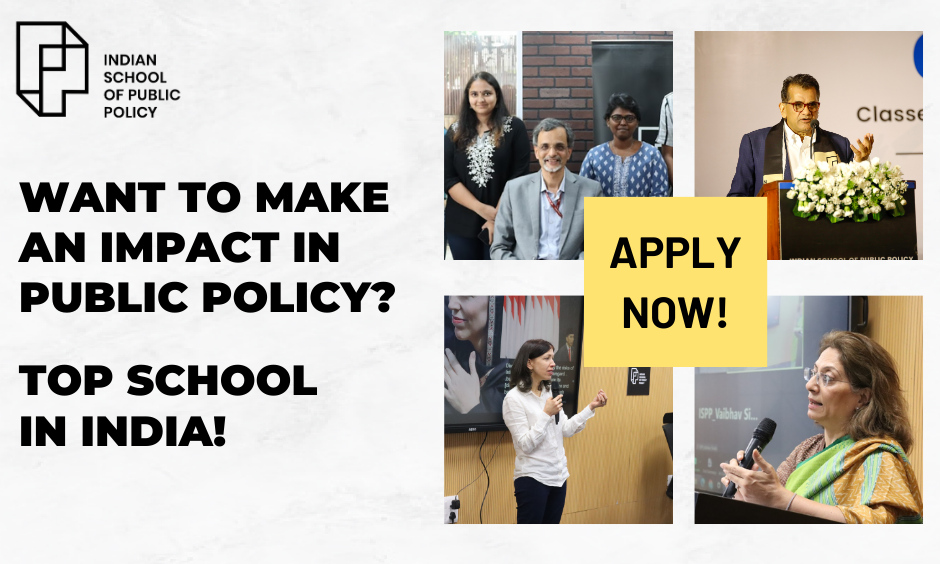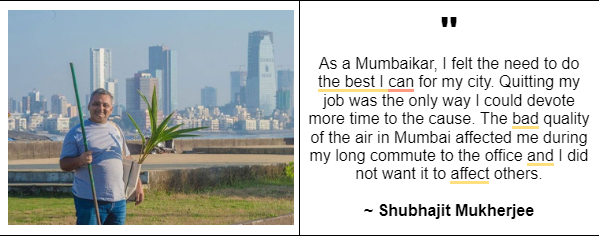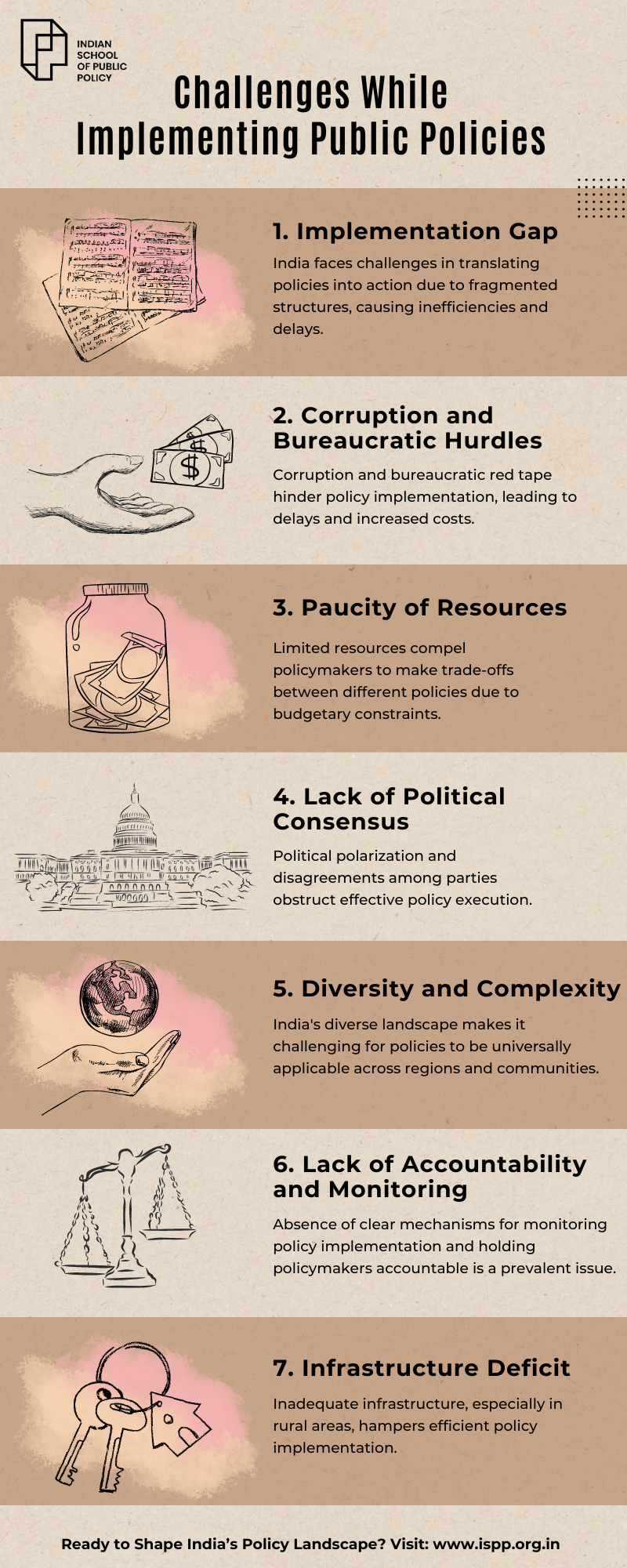
Want to make an impact in public policy? | Top School In India!

Identify The Challenges First! | Who Will Fix It? | Examples Of People Moving Mountains To Make A Difference! | Career Opportunities In Public Policy | PDM By ISPP
The Indian Constitution establishes the structure for public policy, implemented by the government at central, state, and local levels. The policy-making process in India actively engages stakeholders such as civil society organisations, experts, and the general public. There is a rising emphasis on crafting policies grounded in evidence, prioritising data-driven solutions for intricate challenges in recent times.
Let’s study the country’s complexities and challenges before exploring the potential of public policies for change.
Challenges While Implementing Public Policies
Some of the key challenges are as follows –
► Implementation Gap
One of the key hurdles in India is the gap between creating policies and putting them into action. The structure is often highly fragmented, resulting in policies not being executed as planned or experiencing prolonged delays. This leads to inefficiencies and policies that may not fully address citizens’ needs.
► Corruption and Bureaucratic Hurdles
Policymakers in India grapple with significant challenges, such as corruption within government bodies and bureaucratic red tape. These issues can impede the implementation process, causing delays and escalating costs.
► Paucity of Resources
As a developing nation, India faces the ongoing challenge of limited resources. Policymakers must navigate budgetary constraints, necessitating trade-offs between different policies and their effective implementation.
► Lack of Political Consensus
The effective execution of public policy relies heavily on political consensus. In India, political polarisation and a lack of agreement among political parties can obstruct policy implementation.
► Diversity and Complexity
India’s diverse and complex landscape, encompassing various cultures, languages, and socio-economic backgrounds, presents a challenge for policymakers. Policies effective in one region or community may not be applicable in another.
► Lack of Accountability and Monitoring
The absence of a clear mechanism for monitoring policy implementation and holding policymakers accountable is a prevalent challenge in India. Introducing a dynamic monitoring mechanism, and incorporating technology, could enhance accountability in various government initiatives.
► Infrastructure Deficit
A significant hurdle in India is the deficit in proper infrastructure. Inadequate infrastructure, particularly in rural areas, can impede the efficient implementation of policies.
Who Will Design Stronger Public Policies And Ensure Their Implementation?
Public policy professionals play a crucial role in crafting more robust policies for India. The process involves a profound comprehension of the nuanced nature of the issues, designing policies based on evidence that are both effective and sustainable, considering the context of implementation, and evaluating their impacts. The development of effective policies necessitates a meticulous analysis of various options, drawing insights from existing evidence. Hence, there is a dire need for skilled and experienced policymakers who can design effective public policies and ensure their efficient implementation reaches the intended beneficiaries.
From a career perspective, now is an exciting time to embark on a profession in public policy in India. This field offers expansive opportunities, allowing professionals to work across organisations, domains, and on both national and international platforms, spanning both public and private sectors. The youth today is actually gravitating towards a life of fulfilment, as opposed to just monetary gains and some have even quit their high-paying jobs in order to make a difference.
Example:
Prompted by his doctor attributing frequent headaches and sore eyes to pollution, the 39-year-old Shubhajit Mukherjee decided to leave his 12-year career in human resources and embark on a mission to make Mumbai greener. This Malad resident relinquished his well-paying job with the intent of contributing to a greener Mumbai, focusing on planting saplings.
He has successfully planted 29,230 trees across the city, achieving an impressive 95% survival rate.

Career Opportunities In Public Policy
Governments are increasingly receptive to incorporating fresh talent, ideas, and designs from beyond traditional bureaucratic circles. This shift reflects a growing acknowledgment of the importance of diverse perspectives in shaping effective public policies for the future.
For those interested, here are a few career opportunities in Public Policy –
1. In the Government Sector
Public Policy plays a crucial role in various government activities spanning Environmental Sciences, Social Sciences, International Relations, Political Science, Administration, Law, Management, Geography, Economics, Science, Maths, and Statistics. Both state and central governments offer abundant opportunities in rural and urban planning, actively seeking professionals with expertise in public policy across these diverse domains.
2. Research and Development
The field of research and development boasts numerous national and international organisations engaged in advanced research related to public policy. Pursuing advanced courses and engaging in research activities presents a viable avenue for building a successful career. Various institutes now offer comprehensive courses, creating promising career paths for individuals interested in this field.
3. Teaching
Public Policy stands as one of the prestigious courses in Indian universities. Educational institutions not only impart knowledge and training but also facilitate placements for students. Those inclined towards teaching can secure positions as lecturers and professors in both public and private universities.
4. Public Administration and Public Policy
Public administrators, possessing a deep understanding of both society and policies, navigate the complexities of political pressures, civil society, media, political parties, and other groups. A background in public policy enhances their ability to execute their responsibilities with precision and ethics, benefiting both the government and the people.
5. Management and Public Policy
Enrolling in a Public Policy course provides programme and operations managers insights into managing financial and HR policies within their organisations. It equips them to design effective public policy strategies and imparts valuable soft skills such as time management, project handling, and resilience during challenging periods.
The introduction of specialised courses in Public Policy, though relatively recent in countries like India, proves instrumental. A foundation in this field enables individuals to comprehend the country’s challenges, adapt existing policies, and contribute to the formulation of new policies and programmes.
Which is the best school that can equip you with relevant skills and knowledge?
PDM at ISPP
Founded in 2018 under the aegis of India’s esteemed public policy think tank, the Centre for Civil Society (CCS), the Indian School of Public Policy (ISPP) has emerged through collaboration with influential policymakers, experts, and thought leaders. ISPP is dedicated to delivering exceptional education with a world-class faculty, robust industry connections, and an innovative methodology in policy design and management. Its overarching goal is to revolutionise the landscape of policymaking.
The Post Graduate Programme in Public Policy (PGP) provided by the Indian School of Public Policy (ISPP) stands as a highly esteemed and inclusive initiative. This programme is meticulously crafted to get the students ready for a rewarding career in public policy. Its design aims to furnish students with the essential knowledge, skills, and values necessary to excel as proficient policy professionals within the government, civil society, or private sector.
Register your Interest to Study at ISPP
Infographic



